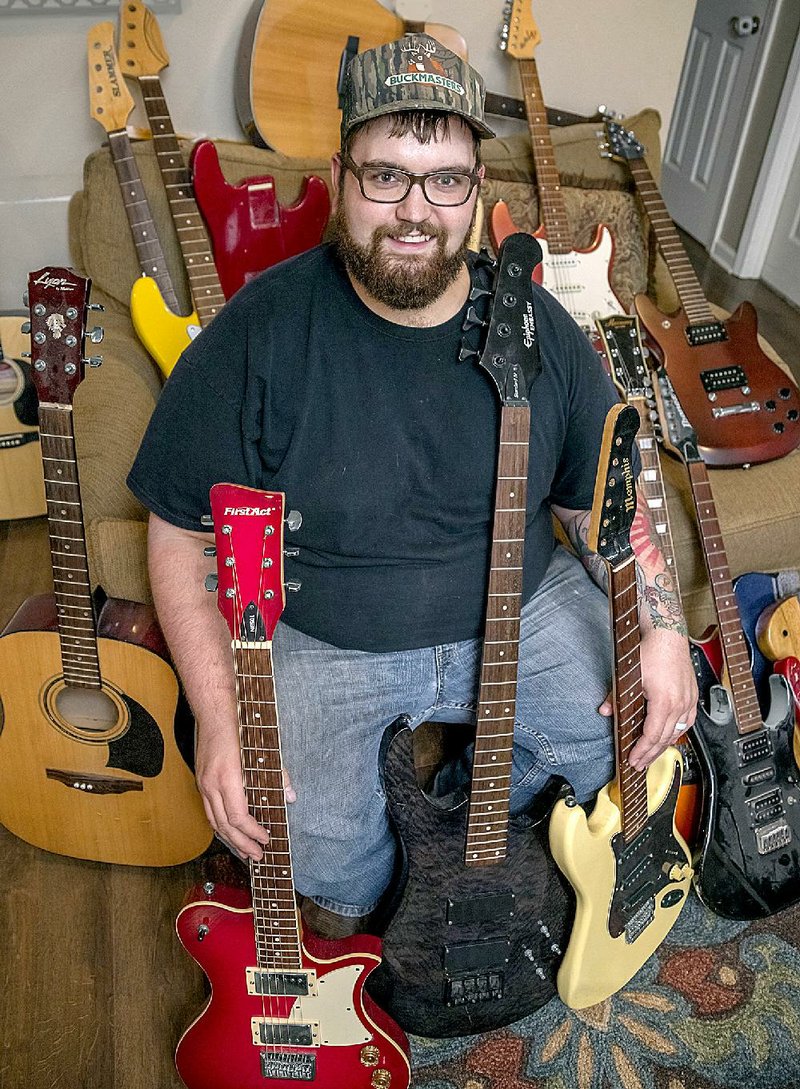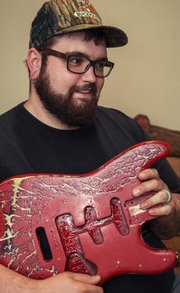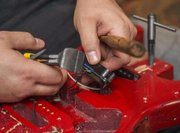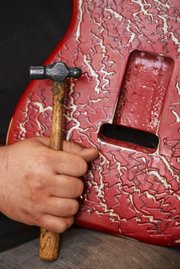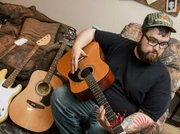Remember when you were going to be the next Jimi Hendrix? You bought that really nice guitar, picked up a how-to book, watched instructional videos on YouTube and drove everyone you knew crazy by practicing all the time?
But those barre chords were tough to get your fingers around, and forget about that tricky F chord, which is nearly impossible to make but is in just about every cool song there is. So now your once-gleaming new axe sits banished, along with your rock 'n' roll fantasies, to the dark corner of some closet, collecting dust.
Maybe the strings are broken after your last Pete Townshend windmill of frustration, and the neck has probably bowed a bit over time, or perhaps there's a crack in the body from when you went all Kurt Cobain and tried to smash it against an amp.
But there is hope. Not for you finally becoming a rock star, but for your poor old guitar, and there's a good chance that you could help make someone else's musical dreams come true.
This is where Stephen Rowland and his fledgling Project Give A Guitar comes in. The 26-year-old tattooed, bearded and bespectacled Rowland has been gathering used and abused guitars and basses to restore and give away to young people whose families may not be able to pay for a brand-new rig.
"I grew up not being able to afford the instruments I saw in music stores," he says, but a gift of an acoustic, six-string Takamine guitar on his 16th birthday set him on a musical path.
"My uncle gave it to me and it just made my day," Rowland says. "It was special to me not only because he gave it to me, but because it was something I could play and learn how to make music on."
He's strumming that very guitar on a November evening at the home in Sherwood he shares with wife Emilea and their two children, 2-year-old Finley and newborn Gregory.
Along with that Takamine, Rowland, who grew up in North Little Rock, is surrounded by 16 other guitars in various states of repair in his small living room, which now looks like the Island of Misfit Instruments.
There are a few electric basses, several electric six-strings, a smattering of stringless acoustics and a handful of guitar bodies minus their necks. Rowland's plan is to refurbish each of them to their original glory and give them away to some aspiring young Stevie Ray Vaughan or Bootsy Collins.
"Even though these aren't big-named guitars, it could still mean the world to a kid," he says. "I take pride in playing music and I want to give back to kids that want to learn how to play."
As of yet, he hasn't given any away, but those interested in receiving an instrument can email Rowland at [email protected].
And while he hopes that many of the guitars clogging his garage shop will turn out to be Christmas presents, he adds that he wants to continue Project Give A Guitar long after the holiday season is done.
"I really want this to roll," he says. "I'm not making money off of this. People have asked, 'Are you going to keep this [instrument] for yourself?' No. This is for kids. I want to see their faces when they get their first guitar."
Right now Rowland, who works in shipping and receiving at Camp Robinson, is gathering more instruments and bits and is steadily getting them all in playing condition.
"Amps," he says quickly when asked if there is anything he desperately needs for the project. "You have to have an amplifier if you're going to play electric guitar." Parts, straps and strings would also be welcome, along with guitars, no matter the condition.
"We're always looking for more," he says, "and everything's fixable."
Several of the instruments have come from music shops like North Little Rock's Dogtown Sound and Guitar Center in Little Rock.
"I gave him a handful of parts and a guitar body and a neck or two," says Adrian Bozeman, owner of Dogtown Sound. "If I'm not mistaken, it was a Memphis Stratocaster and a couple of necks, tuning keys and some pickups."
Bozeman and Rowland have also discussed the possibility of giving away guitars during a concert at the store's Park Hill parking lot, but no plans have been firmed up.
"There would be a rock show going on and the kids could come up onstage and get their guitars," he says.
For Bozeman, getting neglected guitars into the hands of young people who are interested in playing certainly beats the alternative.
"It's better than the instrument making it to the landfill," he says.
[EMAIL UPDATES: Sign up for free breaking news alerts + daily emails of the day's top headlines]
Rowland's friends at Guitar Center, where he once worked, also donated an Epiphone Embassy bass that had been damaged.
Another source of instruments is Scott Welch of Little Rock, who had a surfeit of gear when he eased back on his guitar-building hobby.
"I ended up having a lot of stuff," he says, "and when I heard what he was doing, I thought I'd rather have somebody else get this than me try to sell it for a loss."
Rowland had reached out to Welch and after the two met, Welch's enthusiasm for the project grew. He has donated five guitars, acoustic and electric, some in working condition and some not.
"I'd rather kids have them," he says, adding that he has also given some of his old instruments to the music program at Don R. Roberts Elementary School in Little Rock. "If you want to give kids some kind of method of expression rather than throwing rocks at each other, this is a good thing. We don't teach it in school like it should be. It's a good deal. This is something I've always thought of doing, but just never had the time."
Not surprisingly, Rowland -- who also sings, plays mandolin, drums and harmonica -- has always been handy. He started tinkering on guitars shortly after he got that Takamine from his uncle. The Rowland living room is decorated with old tools, cans and other small items that belonged to Emilea's grandfather and are displayed on a shelf Rowland built. He makes and sells fishing tackle and also sells a homemade instrument called a canjo.
"They're banjos I make out of paint thinner cans," he says. "They're really cool and they sound just like a banjo."
He's self-trained when it comes to guitar repair and says the hardest part of fixing those wrecked axes is the fretwork (sort of like mastering that elusive F chord). "You have to be careful and pull the the frets out just right."
His favorite part is "finishing one and listening to it play and hearing what it sounds like."
The finished product, and the joy it potentially holds for a young person who wants to make music, is what really gets him excited.
"What I really want to do," Rowland says, "is take guitars that people don't want or need, make them where they sound great, and give them to kids who couldn't normally afford them because I know how good it made me feel to get my first guitar."
Style on 12/13/2016

